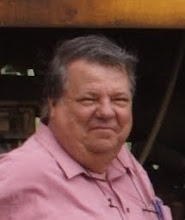We have laid the plywood track base from the right hand wall around to and including the Durango Depot area. It took a considerable effort for us to make sure the curves were true and the plywood was level.
 |
| The plywood track base is being added to the baseboard framework. Here we are looking from the location of the Durango Depot towards the right hand wall. |
 |
| The main line curves around at the right hand wall heading towards the back of The Shed. |
We again have gone through the hiatus of track standards. I printed out another S-7 Standard from the NMRA and some measurements seem to differ to what we had previously. Our concern included the fact that the main line track would be entering the Durango Depot platform on a curve. How much clearance to the platform should we provide? We opted to remeasure one of our K-37 locos to ascertain the widest point using Vernier calipers. This happens to be the window shades over the cab windows which comes out at 68 mm (say 70 mm). So, as we have done previously we have settled on 3 1/2 inches between track centres which should give us a 1/2 inch gap between the cab shades on two K-37 locos passing each other.
 |
| Track laying the main line using Brunel Hobbies and Tracksetts templates. |
We have settled on this clearance yet again. The minimum curve on our main line is 36 inches so as the main line will be the outer loop into Duirango Depot that curve is a shade over 39 inches and we have made the inner (passing loop) 36 inches. Today we marked out the track centres from the right hand wall through to half way along the Durango Depot. We have now laid the track from the right hand wall as far as the turnout for the main line/passin g loop into Durango Depot.
Raymond has tested this track with a K-36 and everything runs smoothly.
 |
| K-36 No 481 stands at the end of track that has just been laid. |
Over the past couple of weekends we have also been working on the locomotive depot for the upper terminus along the left-hand wall.
The DC Walthers HO Scale130 ft turntable pit has been installed and we have started working out the track requirements.
 |
| The turntable required is 65 feet long to allow for the K-36 and K-37 Class 2-8-2 locomotives. It is actually a Walthers HO Scale 130 ft turntable (65 ft in O Scale) |
The turntable bridge uses Code 83 rail so we visited Austral Modelcraft last week and purchased a box of Peco Code 83 Flex track together with four lengths of adapter track Code 100 to Code 83. We also had a long discussion with Ray and a fellow modeller, Arthur, who both have had experience with the Walthers turntable. From the advice they gave us it appears that the older DC turntable will fit in very well and we need not have worried about any issues with DCC. The newer DCC turntable however, is another matter. It apparently is very susceptible to losing its memory regarding track settings when selecting on of the roads off the turntable. Each road has to be programmed twice (once for each end of the bridge). If there is a power interuption for example when a short circuit occurs or when you turn off the main power to the layout at the end of an operating session you have to reprogram every track again. We have not progressed the track layout on this section while we try to work out how we can overcome this issue with the DCC turntable. Ray/Arthur suggested having a separate DCC power supply just for the turntable - which we will do. There are several separate power circuits in The Shed for the layout and other uses. Near the DCC turntable there are four power points on a separate circuit to everything else. I am thinking we will leave those four power points on all the time even when we shut down power to the layout. We can then plug the DCC power supply into one of these power points and the power will be on all the time. Thunderstorms will be a problem though and will probably fry the DCC chips. We are still considering our options.









